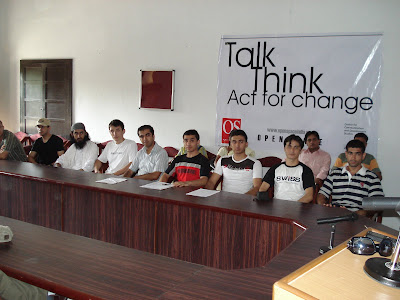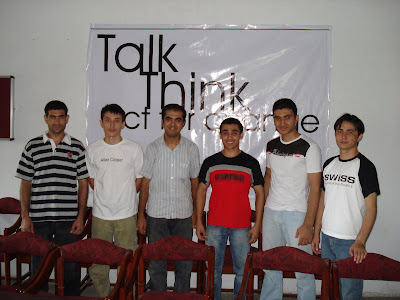

 Hindi novelist Vibhuti Narayan Rai (b. 1950)
Hindi novelist Vibhuti Narayan Rai (b. 1950)The diameter of the bomb was thirty centimeters(Translated from Hebrew by Chana Bloch)
and the diameter of its effective range about seven metres,
with four dead and eleven wounded.
And around these in a larger circle
of pain and time, two hospitals are scattered
and one graveyard. But the young woman
who was buried in the city she came from ,
at a distance of more than a hundred kilometres,
enlarges the circle considerably,
and the solitary man mourning her death
at the distant shores of a country far across the sea
includes the entire world in the circle.
And I won't even mention the crying of orphans
that reaches up to the throne of God and
beyond, making
a circle with no end and no God.
तीस सेंटीमीटर था बम का व्यास(अशोक पांडे एवं शिरीष कुमार मौर्य, अनुवादक, धरती जानती है, प्रथम संस्करण, संवाद प्रकाशन, मेरठ, २००६, पृष्ठ १७)
और इसका प्रभाव पड़ता था सात मीटर तक
चार लोग मारे गए, ग्यारह घायल हुए
लेकिन वह जवान औरत जो दफनाई गयी शहर में
वह रहने वाली थी सौ किलोमीटर से आगे कहीं की
वह बना देती है घेरे को और भी बड़ा
और वह अकेला शख्स जो समुन्दर पर किसी देश के सुदूर किनारों पर
उसकी मृत्यु का शोक कर रहा था -
समूचे संसार को ले लेता है इस घेरे में
और मैं अनाथ बच्चों के उस रुदन का ज़िक्र तक नहीं करूंगा
जो पहुंचता है ऊपर ईश्वर के सिंहासन तक
और उससे भी आगे
और जो एक घेरा बनाता है
बिना अंत और बिना ईश्वर का।
The poem quoted above, "The Diameter of the Bomb", is one of the three poems of the great Hebrew poet from Israel, Yehuda Amichai (1924-2000), that were recited at the third session of the Open Space Book Tasting Club on the theme "Communalism and Terrorism", held at the Academy of Mass Communication, Lucknow on 27th September, 2008. The event was also a commemoration of the emancipation of the Jews of France, which took place in 1791 on this very date, 27th September. While this poem made the people conscious of the magnitude and scale of loss as a result of terrorist attacks, the other poem "Half the People in the World", pointed out the aimless hatred that divides the world and makes peace so elusive:
Half the people in the world love the other half, half the people hate the other half.(Translated from Hebrew by Joshua Cohen)
Must I , because of this half and that, go and wander and ceaselessly change, like rain in its cycle, and sleep among rocks and become rugged like the trunks of olive trees, and hear the moon bark at me, and camouflage my love with worries, and grow like frightened grass between the railroad tracks, and live underground like a mole, and be with roots and not with branches, and not rest my cheek upon the cheek of angels, and make love in the first of the caves, and marry my wife beneath a canopy of beams that support the earth, and act out my death , unto the last breath and the last words, always and without understanding , and put flagpoles atop my house and a bomb shelter underneath. And set forth on those roads made only for returning , and go through all the terrifying stations - cat, stick, fire, water, butcher - between the kid and the Angel of Death?
Half the people love, half the people hate. And where is my place between these well-matched halves? And through what crack shall I see the white housing projects of my dreams, and the runners barefoot on the sands or, at least, the flutter of the girl's kerchief, by the hill?
दुनिया के आधे लोग(अशोक पांडे एवं शिरीष कुमार मौर्य, अनुवादक, धरती जानती है, प्रथम संस्करण, संवाद प्रकाशन, मेरठ, २००६, पृष्ठ ११५-११६)
दुनिया के आधे लोग बाकी आधे लोगों से प्यार करते हैं
आधे लोग बाकी आधों से नफरत करते हैं
क्या इस आधे और उस आधे के कारण मुझे घूमंतू बने रहना होगा
और बदलते रहना होगा वृश्तिच्क्र की तरह अनवरत क्या मुझे सोना ही होगा
चट्टानों के साथ और बनना होगा
जैतून के पेड़ के ताने जैसा रूखा
और सुनना होगा चाँद को जो भौंकता है मुझ पर
और ढांपना होगा अपने प्यार को चिंताओं की मदद से
और फूटना होगा रेल की पटरियों के बीच की भयभीत घास की तरह
और जीवित रहना होगा चूहे की तरह भूमिगत होकर
और रहना होगा जड़ के तरह बिना शाखाओं के
और क्या कभी महसूस नहीं करना होगा फरिश्तों के गालों पर
अपने गालों को और प्यार करना होगा पहली कन्दरा में
और ब्याह करना होगा धरती को सहारा देने वाली बल्लियों के
शामियाने के नीचे और अभिनीत करनी होगी अपनी मृत्यु
अन्तिम सांस और अन्तिम शब्द तक , कभी भी उसका अर्थ समझे बिना
और ऊंचा फहराना होगा अपने घर के ऊपर झंडा
और नीचे बनाना होगा बमों से बचना को तहखाना
और उन सड़कों पर जाना होगा जो केवल लौटने के लिए बनी हैं
और गुज़रना होगा उन डरावने स्टेशनों से - बिल्ली, लाठी, आग, पानी,
कसाई, बच्चे और मौत के फ़रिश्ते के बीच से होकर
आधे लोग प्यार करते हैं, आधे नफरत
एक-दूसरे के लिए बने इन दो आधों के बीच कहाँ है मेरी जगह?
और कौन सी दरार से देख सकूंगा मैं
अपने सपनों के वे उजले हाऊसिंग-प्रोजेक्ट
और बालू पर नंगे पाँव दौड़ते धावक या कम-से-कम टीले की बगल में
लहराता हुआ लडकी का रूमाल।
The third poem of Yehuda Amichai, "The Tourists" was read out to make the students realise that nothing is more important than human life. The poem was as follows:
Once I sat on the steps by a gate at David's Tower and placed my two heavy baskets at my side.
A group of tourists was standing around their guide and I became their target marker.
"You see that man with the baskets? Just right of his head there's an arch from thr Roman period. Just right of his head."
"But he's moving, he's moving!"
I said to myself: redemption will come only if their guide tells them, "You see that arch from the Roman period? It's not important, but next to it, left and down a bit, there sits a man who's bought fruit and vegetables for his family."
(Translated from Hebrew by Glenda Abramson and Tudor Parfitt)
सैलानी(अशोक पांडे एवं शिरीष कुमार मौर्य, अनुवादक, धरती जानती है, प्रथम संस्करण, संवाद प्रकाशन, मेरठ, २००६, पृष्ठ १४०-१४१)
एक बार मैं डेविड के किले के प्रवेश द्वार के पास सीढियों पर बैठा था ।
अपनी दो भारी टोकरियाँ मैंने नीचे रख दी थीं बगल में। वहीं, अपने गाइड के साथ खडा था सैलानियों का एक झुंड । और मैं उनके लिए एक सन्दर्भ बिन्दु बन गया - "वहाँ देख रहे हैं आप वह आदमी जो टोकरियों के साथ बैठा है? उसके सर के दाईं तरफ़ रोमन काल का मेहराब है, वो उसके सर के थोड़ा दाईं तरफ़। "लेकिन वह आदमी तो हिल रहा है , हिल रहा है वह।" मैंने ख़ुद से कहा : मुक्ति तब मिलेगी जब उन्हें बताया जायेगा - देख रहे हैं वहाँ जो रोमन काल का मेहराब है ? वो कोई ख़ास नहीं, उसके पास, थोडा बाईं तरफ़ और ज़रा सा नीचे एक आदमी बैठा है, अभी-अभी अपने परिवार के लिए उसने फल और सब्जियां ख़रीदी हैं।
All the above mentioned poems were read in Hindi from the Hindi translation of a selection of Amichai's poems: Ashok Pandey and Sirish Kumar Maurya, Dharti Jaanti Hai, First Edition, Samvaad Prakashan, Meerut, 2006.
An Urdu poem "Ek Buree Surat-e-Haal", taken from Anwar Nadeem's collection of poems Jai Shri Ram!, Humlog Publishers, Lucknow, 1993, was also read out to draw attention to the the rise of communalism in India:
दो चार नहीं, सैकडों
बहुत बुरी बातें हो गयीं
फिर भी कुछ लोग
यही समझ के बैठ रहे
अब कुछ नहीं हो सकता !
मालूम नहीं फिर किसने उकसाया
नमाजें पढने लगे
और अपने दीन को समझने की
संजीदा कोशिशों में
एक दूसरे से
दूर होते गए !!
Poetry recitation was followed by the reading out of excerpts from Vibhuti Narayan Rai's Hindi novel शहर में कर्फियु (Curfew in the City), First Edition, Sambhavna Prakashan, Hapur, 1988.
After the reading there was a lively discussion with the students on Terrorism and Communalism.













































